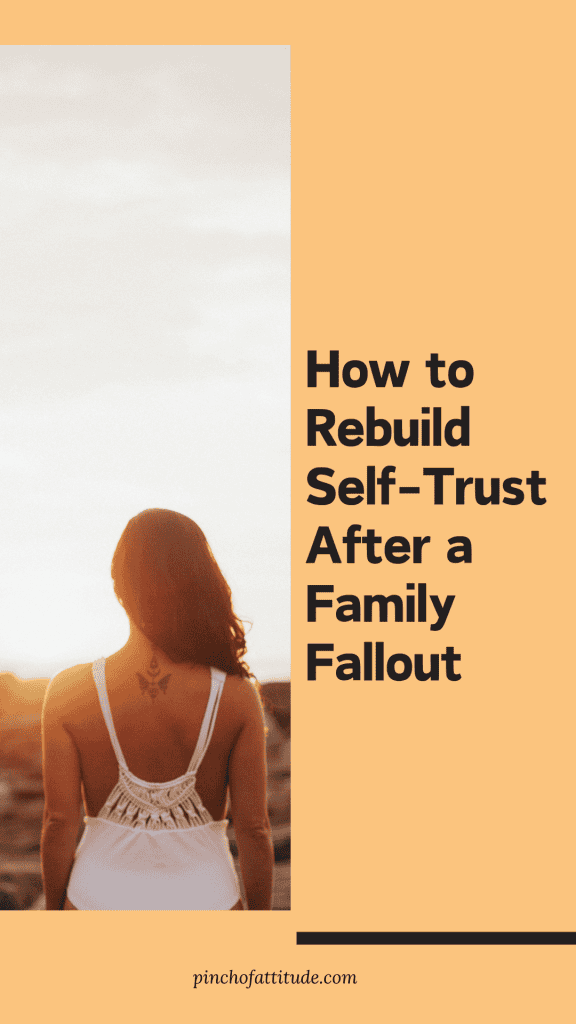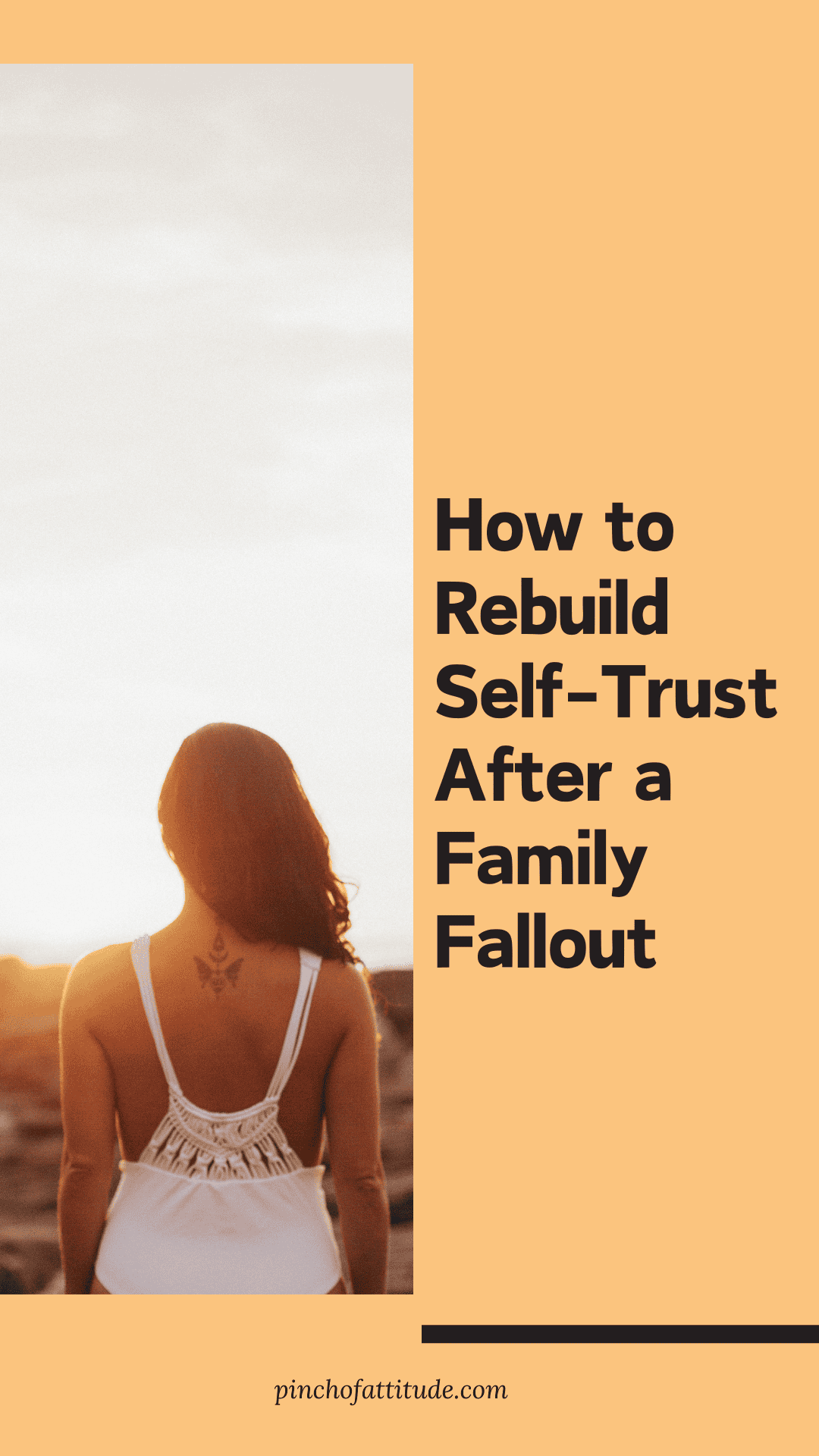A few years back, I went through a pretty tough situation with someone I trusted completely – my own sibling.
It hit me hard, you know? It made me question everything, not just them but myself too. But amidst all that mess, I stumbled upon a lesson that really changed the game for me.
I learned that I should always trust my instincts, no matter what. If something feels off, I’ve learned to take a step back and really listen to that inner voice.
For a long time, I’ve always made my decisions based on my emotions, but it only led to more heartache than I bargained for.
If I only trusted my gut back then, my emotional scars wouldn’t be this deep. Then, I realized that I should never doubt myself again.
This realization was a game-changer in my healing journey and figuring out who I am. It taught me the importance of tapping into my inner wisdom, especially when things get rough.
Below, I want to share with you the strategies and practices that helped me rebuild trust in myself after going through betrayal.
- Restoring trust in yourself helps you regain confidence in your decisions and navigate future relationships more effectively.
- Recognize that you’re not responsible for someone else’s actions and embrace self-forgiveness to move forward positively.
- Seek out people who uplift you and believe in your ability to heal and grow.
Table of Contents
Why is Rebuilding Trust in Yourself Important After a Toxic Betrayal?

Experiencing betrayal, especially from someone as close as a sibling, really messes with your self-belief and confidence.
It’s not just about the broken trust in that relationship, you know. It also messes with how you see yourself and your ability to trust your own gut.
This self-doubt can hang around long after the initial sting wears off. So, why is it important to bounce back and trust yourself again after something like that?
Well, here’s why it matters:
- Getting back that trust in yourself helps you rely on your instincts and judgments again. It allows you to take back the steering wheel of your life.
- Trusting yourself brings inner stability and resilience. It’s like having an anchor when things get rough, giving you the guts to face challenges.
- When you trust yourself, you’re better at handling future relationships. You can draw clearer lines and make better choices.
- Rebuilding self-trust is huge for personal growth. It lets you learn from what’s happened and move ahead with more smarts and clarity.
- Trusting yourself is a big part of healing. It helps you let go of anger and open up to forgiveness, which is good for your heart.
Rebuilding trust in yourself after being let down by a sibling is about owning your today and setting a solid base for your future relationships and growth.
How Can I Begin to Trust Myself Again After Sibling Betrayal?
I get how tough it is to rebuild trust in yourself after such a deep betrayal. It’s like tiptoeing into new territory, not knowing where to step next.
But hang in there—there’s a way forward.
I’ve been in that spot, frozen by doubt, but with time and a little self-kindness, I found the first steps to reclaiming my inner trust.
Look where it got me. I am now on the other side of the tunnel, giving tips on how you can successfully walk along its darkness and finally get to the light – to where I am now.
So, where do you start? Here are some practical steps to guide you:
Give Yourself Permission to Feel
After dealing with betrayal from a sibling, you’re hit with a whole wave of emotions – anger, sadness, confusion, maybe even guilt.
The first thing to do to start rebuilding trust in yourself is to let yourself feel all of this without holding back.
Give yourself the green light to fully acknowledge and accept what you’re going through.
Tip
When we shove our feelings aside, they can stick around and mess with our self-trust. Instead, try showing yourself some kindness by recognizing that your emotions make sense given what you’ve been through.
Treat Yourself With Kindness and Understanding
After being let down by a sibling, you have to be extra kind to yourself.
You might be wrestling with self-blame or beating yourself up, but hey, cut yourself some slack – you deserve compassion just like anyone else going through a tough time.
Try treating yourself like you would treat a close friend in need. Be easy on yourself with your thoughts and actions. Maybe that means doing things that calm you down.
In my case, I do hobbies that make me happy, like writing and sports. I even go on walks at times to spend time with nature.
Identify What Matters Most to You
Take some time to think about what truly matters to you in life – the things you believe in and the kind of person you want to be.
Consider how your sibling’s betrayal clashed with these values. Maybe it shook your trust, challenged your sense of honesty, or felt like a breach of loyalty that’s important to you.
It lets you gain insight into how it affected your sense of identity and what you stand for.
This self-reflection is a chance to reaffirm your values and realign your life with what’s important to you.
Let Go of Self-Blame and Forgive Yourself
It’s super common to start blaming yourself or feeling guilty when your siblings betray you.
But here’s the scoop – holding onto those feelings can really slow down your journey to rebuilding self-trust.
So, how about we work on letting go of that self-blame and giving ourselves a break?
First off, remind yourself that you’re not accountable for someone else’s actions. Let go of any misplaced guilt and realize that you did the best you could with what you knew at the time.
Tip
Forgiving yourself means embracing your own humanity, flaws, and inherent worth. Embrace self-forgiveness as a way to rebuild that trust within yourself and kickstart your emotional healing.
Cultivate Self-Reliance
Start boosting your self-reliance and inner strength by recognizing your capabilities and fostering a sense of independence.
Begin making decisions on your own, even if they’re small ones to start with. Trust your instincts and honor that gut feeling because they’re like your personal compass.
As you work on your self-reliance, you’ll start feeling more empowered and confident in your abilities.
Take Time to Reflect on Your Strengths

Take some time to think about your natural strengths and resilience. It’s key to acknowledge the qualities in you that have helped you get through challenges and rough patches.
Try doing some self-reflection exercises, like jotting down your strengths, thinking back on past wins, or getting feedback from people you trust.
This boosts self-appreciation and builds a positive self-image. It’s a way to remind yourself that you’ve got what it takes to tackle obstacles and thrive, even when things get rocky.
Tip
You’ve got a ton of inner resources just waiting to guide you toward self-renewal and trust. Embrace this journey of self-discovery and recognize the strengths that make you who you are.
Extract Lessons From the Betrayal
As you’re working on rebuilding trust in yourself after dealing with sibling betrayal, I want to encourage you to take a moment and learn from this experience.
Think about what this tough situation has taught you about yourself, relationships, and life in general.
Ask yourself some questions:
- What signs did I miss that could have tipped me off?
- How can I do a better job of setting boundaries in future relationships?
- What strengths did I discover in myself during this tough time?
- How can I use this experience to be more understanding and empathetic towards others?
In my case, what I learned during those moments of betrayal was to trust my instincts. Still one of the life lessons I live by every day.
Tip
Every bump in the road is a chance to learn and grow. Let these lessons guide you towards greater self-trust and inner strength.
Surround Yourself With Supportive People
Rebuilding trust in yourself after sibling betrayal can be a real uphill climb, but you don’t have to tackle it solo.
Surround yourself with a supportive crew of family, friends, or a therapist who can give you that boost of encouragement, empathy, and understanding.
Seek out relationships that lift you and validate what you’re going through. Connect with people who genuinely want to see you heal.
Tip
Choose to be around those who lift you up and believe in your ability to rebuild that self-trust.
Be Patient With Yourself
You know what else is important in this journey? Patience and self-compassion.
Healing takes time, so it’s key to give yourself that room to heal at your own pace. Don’t rush the process or feel like you need to bounce back overnight.
It’s totally okay to let yourself heal and grow naturally, taking things one step at a time. Be gentle with yourself when you hit those moments of doubt or setbacks.
Tip
Healing isn’t a straight road – it’s okay to have ups and downs. Every little step forward is a sign of your strength.
Related Posts:
- What to Do When Your Sister Betrays You? My Smart Ways
- Surviving Sister Betrayal: Here’s How I Handle It Like a Boss!
- How I Developed a Strong Self-Identity While Dealing With My Toxic Sibling?
- Finding Closure in Toxic Sibling Relationships: What I Did
- Healing Emotional Scars After Sibling Toxicity: How I Did It!
Frequently Asked Questions
Why is rebuilding trust in yourself important after being betrayed by your sibling?
Rebuilding self-trust is crucial because betrayal can shake your confidence not just in others but also in yourself. Restoring this trust empowers you to rely on your instincts and regain control of your life.
How can I begin to trust myself again after experiencing sibling betrayal?
To start rebuilding self-trust, allow yourself to acknowledge and accept your emotions without judgment. Treat yourself kindly and engage in activities that bring you joy and calmness to foster self-compassion.
What steps can I take to cultivate self-reliance after sibling betrayal?
Cultivate self-reliance by making decisions independently, even starting with small choices. Trust your instincts and recognize them as your personal compass guiding you toward empowerment and confidence.
How do I let go of self-blame and forgive myself after sibling betrayal?
Letting go of self-blame involves understanding that you are not responsible for someone else’s actions. Embrace self-forgiveness as a pathway to rebuilding trust within yourself and initiating emotional healing.
Why is surrounding myself with supportive people important during the process of rebuilding trust?
Having supportive relationships during this journey provides encouragement, empathy, and validation. Being around people who believe in your ability to heal can significantly aid in rebuilding self-trust and resilience.




